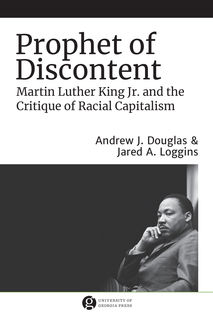Prophet of Discontent
Martin Luther King Jr. and the Critique of Racial Capitalism
Many of today’s insurgent Black movements call for an end to racial capitalism. They most often take aim at policing and mass incarceration, the racial partitioning of workplaces and residential communities, and the expropriation and underdevelopment of Black populations at home and abroad. Scholars and activists increasingly regard these practices as essential technologies of capital accumulation—evidence that capitalist societies past and present enshrine racial inequality as a matter of course.
In Prophet of Discontent, Andrew J. Douglas and Jared A. Loggins invoke contemporary discourse on racial capitalism in a powerful reassessment of Martin Luther King Jr.’s thinking and legacy. Like today’s organizers, King was more than a dreamer. He knew that his call for a “radical revolution of values” was complicated by the production and circulation of value under capitalism. He knew that the movement to build the beloved community required sophisticated analyses of capitalist imperialism, state violence, and racial formations, as well as unflinching solidarity with the struggles of the Black working class. Shining new light on King’s largely implicit economic and political theories, and expanding appreciation of the Black radical tradition to which he belonged, Douglas and Loggins reconstruct, develop, and carry forward King’s strikingly prescient critique of capitalist society.
"It is no longer true that the radicalism of Dr. King is ignored . . . but no book so thoroughly shows how his radicalism, and changes in it, developed through study and, especially, through participation in a social movement confronting the deadly serious problems of racial capitalism. Prophet of Discontent is a significant contribution to the study of both King and the movement."
—David Roediger, author of The Production of Difference
"This is an excellent book, full of terrific insights into the world of Martin Luther King Jr. and what he has to offer theoretically and methodologically to contemporary issues of race, economics, and politics. . . . It reveals, through superb writing, how King’s contributions stemmed from real-world, real-life social and economic circumstances."
—Edward J. Blum, author of W.E.B. Du Bois, American Prophet
Table of Contents
Metadata
- rights

This work is licensed under a Creative Commons Attribution-NonCommercial-NoDerivatives 4.0 International License.
- isbn9780820360164
- publisherUniversity of Georgia Press
- publisher placeAthens, Georgia
- rights holderUniversity of Georgia Press


